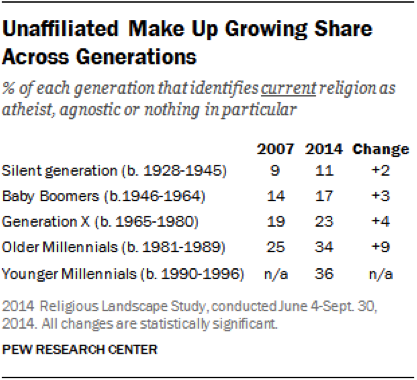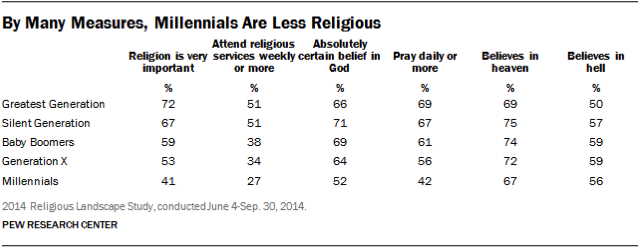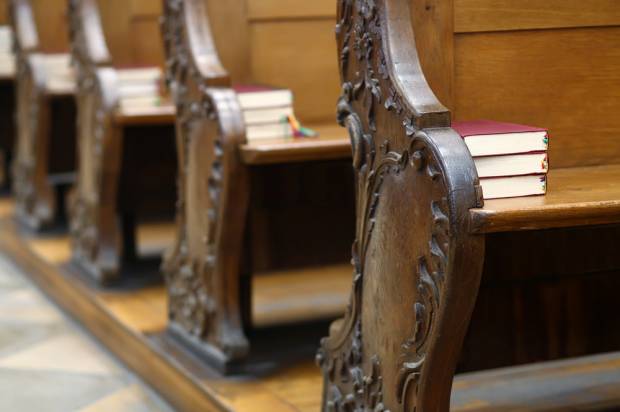By Jennifer Watkins

A recent study conducted by the Pew Research Center found that Millennials are less religious than their parents, with 34 percent of older Millennials and 36 percent of younger Millennials not identifying with any religion at all. These so-called “religious nones” have been on the rise since the start of the twenty-first century, but as Millennials have gotten older, this category of religious identification has grown considerably, rising from 25 percent in 2007 to 34 percent in 2015. Millennials, being defined as those born during the early 1980s through the late 1990s, have grown up in a unique time of cultural shift and globalization. During the nearly thirty five years of this generation, changes in things like technology and politics have transformed the way children are raised, and therefore the adults they become.
As children of Baby Boomers and Generation X, young people today were raised in a much different cultural climate than their parents and grandparents. During their younger years, Gen Xers and some late Baby Boomers spearheaded what were considered to be fairly counter-culture social movements, such as the secularization of public schools and the feminist movement. As revolutionaries themselves, Boomer and Gen X parents encouraged their children to think for themselves and promoted the secularization of society, notions which began to shape the way these children viewed organized religion. As a result of their upbringing, Millennials’ rejection of religion has “been generations in the making,” law professor Robert Destro claims.
In addition to the way their parents raised them, the technological changes that have all but defined the upbringing of most Millennials naturally have had a considerable impact on their worldviews as adults.

Rising in importance during the early 2000s, the Internet came to hold a vital position in the lives of Americans, especially Millennials. As the only generation to have witnessed such noteworthy and rapid technological development that affects nearly every facet of daily life in only the first quarter of their lives, Millennials’ perspective on established institutions such as religion is heavily influenced by the Internet. The idea of such a technology that allows access to the information and millions of unique perspectives breaching the extent of human capacity would have seemed absurd to previous generations. And now, Millennials have access to boundless resources with which to explore every topic imaginable, including their beliefs.
While it was much more counter-cultural for Baby Boomers and Gen Xers to rebel against and question their upbringing, Millennials are now free (and even encouraged) to question everything they are taught. Because of this, more young adults desire to fact-check the things they know about religion, and expose themselves to differing opinions. As a result, they have begun to meet organized religion with acute cynicism.
Now, many young people who have seen the negative side of more extreme religious views would rather not be associated with the negative reputation that organized religion has developed, and thus choose not to identify with any religion in particular. Additionally, many religious institutions are associated with reactionary stances on key social issues, such as the anti-science or anti-feminist movements, which clash with Millennials’ own beliefs and put these young people even more at odds with the belief systems under which they were raised.
https://www.youtube.com/watch?v=RTKI7YhIpg0
The previously referenced Pew Research study also adds that while many Millennials don’t affiliate with any religion, they still consider themselves to be spiritual. This raises the question as to whether Millennials’ flight from organized religion has to do with skepticism of religious beliefs or rather disillusionment with the broader culture surrounding religion and religious organizations themselves.
Michael Hout, a sociology professor at New York University, adds that “general Social Survey data on confidence in the leadership of major institutions show that younger people particularly are not as confident as older adults when it comes to institutions like the press, government and churches.” This distrust shows through in Millennials’ apprehension to accept organized religion, as economic hardships such as the 2008 recession and scandals such as the Catholic child abuse scandal have made many young people skeptical of the institutions their parents built and supported.
When considering what this apparent disillusionment with organized religion could mean for the future of America, it is important to note that younger Millennials are still in their twenties, an important period of the formation of personal beliefs and understanding how to relate faith to secular reasoning. As such, their views on organized religion may change as they grow older and leave quite a different imprint on the broader societal view of religion.
That being said, Millennials are not children; they are beginning to enter the public arena and influence policy-making, and as a result, their views on cultural institutions such as religion have already begun and will continue to directly affect our country.
The separation of church and state, a heated issue that has been heavily debated for generations, will likely continue to find success on the political stage. As this generation continues to foster the secularization of national government, hot-button social issues such as same-sex marriage and abortion should be expected to experience less resistance among voters, and thus lawmakers.
Sociological evidence has shown that people tend to leave organized religion when they are young and return to it when they start building a family in order to instill good morals in their children. Whether or not this pattern will continue in Millennials, the structure of the church within the next twenty years will likely be radically different than it was even ten years ago. Those deeply spiritual young people who are not leaving the church are transforming it into something more welcoming and accessible to outsiders. It’s not unrealistic to say that the next generation will be even less religious than Millennials, as the trend over the past hundred years has evidenced. However, as the very meaning of what it means to be religious in American society evolves over the Millennial lifespan, these religious ‘nones’ may soon become the religious revolutionaries of generations to come.
